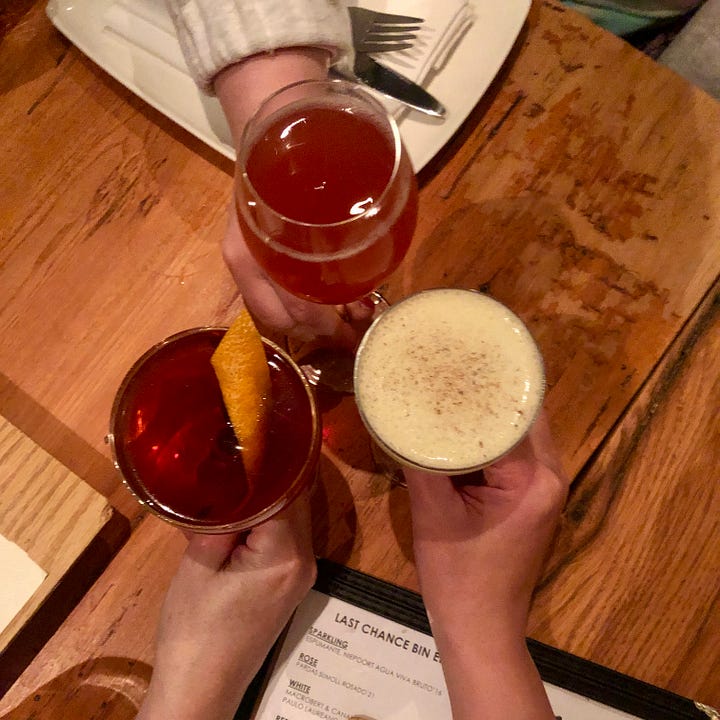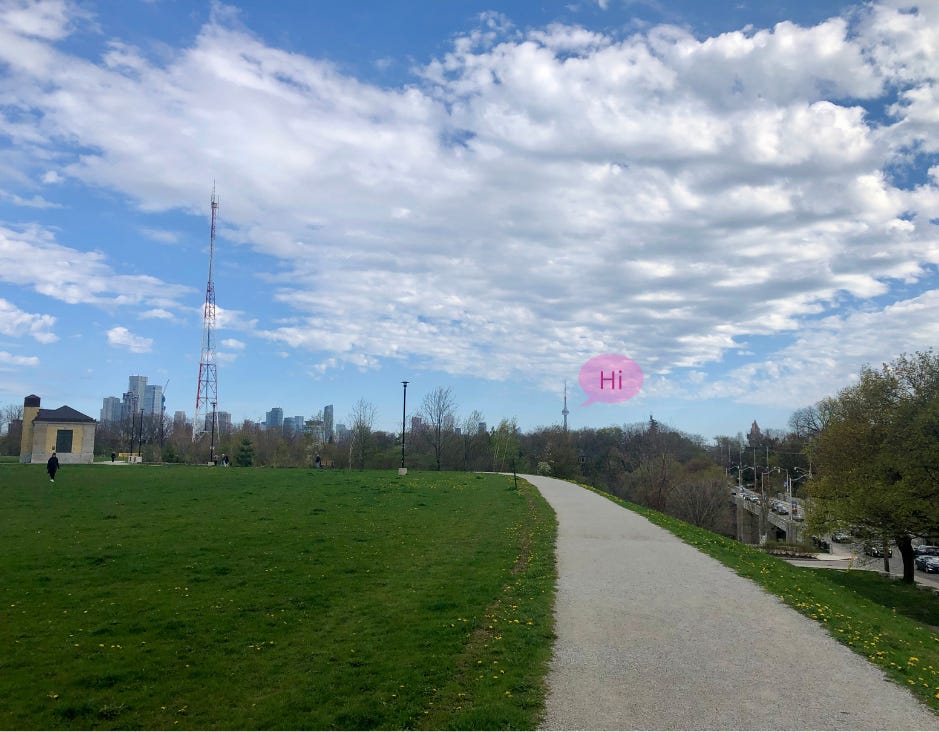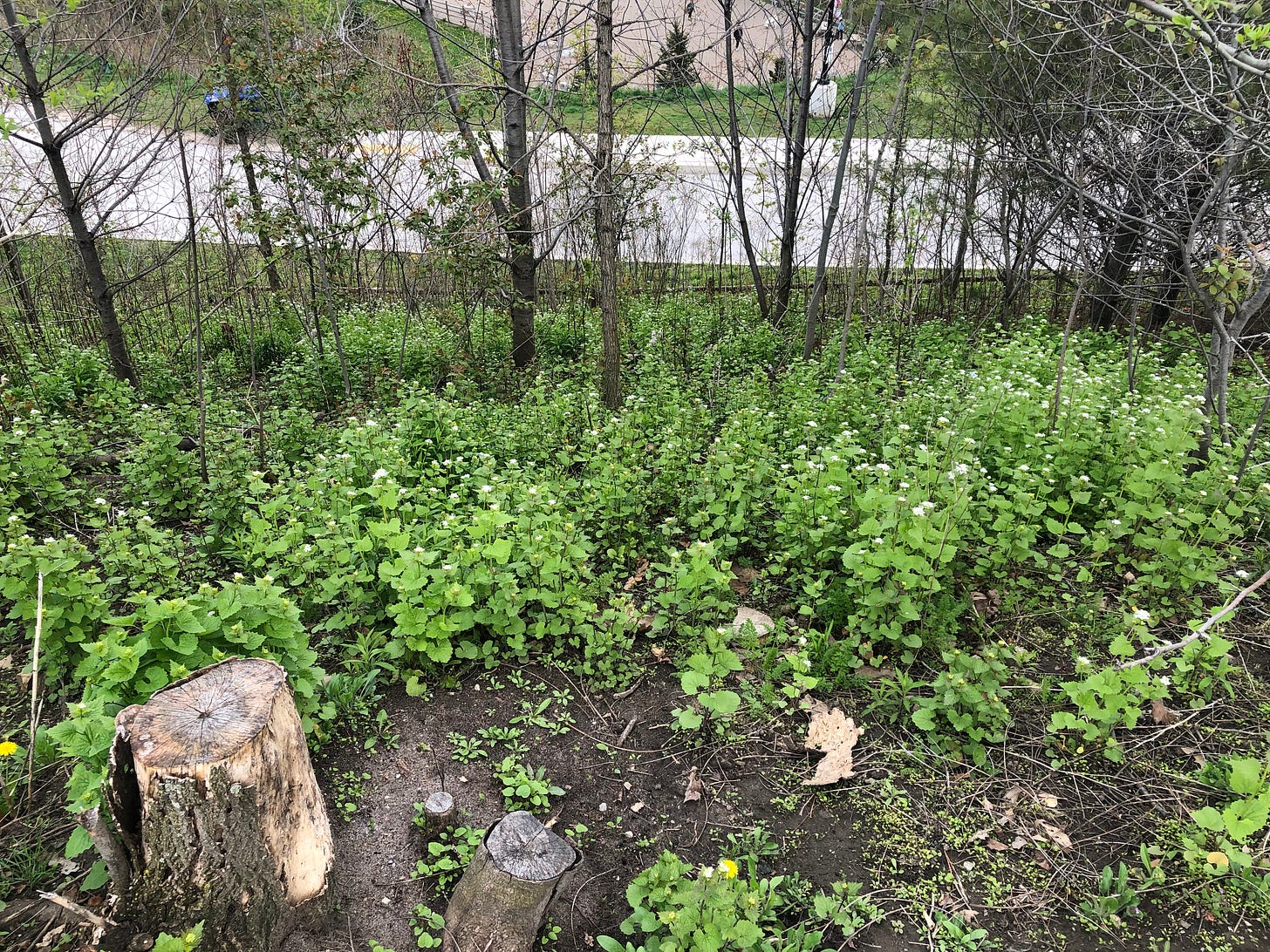On the last day of April, my partner David and I went for a walk after dinner at the park near our house. I was coming off of a bit of a bummer day, maybe a bit of a bummer week. We walked around the park’s running track from which you can see the CN tower in the distance. When we arrived that night, the tower was nearly hidden by a scrim of fog. “That looks cool,” I said to David. He earnestly replied, “Yeah,” and I started to feel a little better. We walked slowly and foraged for garlic mustard along the way. There were a bunch of guys playing rugby in the field surrounded by the track, and as I casually observed them the realization took hold that this game involves a bunch of men lifting another man by the waist, ballet-style, at regular intervals. It was weirdly beautiful to see.
We walked and talked about our days and the sad things going on in the world and the sad things going on in our personal lives, and discussed the chicken-and-egg nature of depression. Am I noticing more how sad the world is because I’m sad? Am I sad because of how sad the world is? Does it matter? We’ve talked about this so many times.
We yanked the garlic mustard up by the roots, which is what you’re supposed to do because it’s an invasive species. It’s right to kill it, they say. I have to admit I enjoyed doing a bit of controlled violence in the name of the greater good. Not an impulse I’d like to chase that much, but something to notice all the same.
All April I felt a bit foggy; most mornings I got a slow start. I was walking on spongy ground, there was a lot of darkness, damp cold, big rains. There were also some floods of warmth and light almost too beautiful to see.
Later, at home, cutting off the dirty roots of the garlic mustard stems, I said to David, “Maybe I always get low-key depressed in the Spring. I just remembered last year around this time I took a billion photos of garlic mustard and the food I made with it, but never had the energy to share any of it.”
David said, “Transitions are hard.” We’ve probably said that to one another three hundred times each in our nearly twenty years together. It always helps.
Writing
Near the end of the month, I read
’s latest post about interiority in writing — “the stuff that goes on inside a character’s head” as she puts it. In spite of my caveats below, I recommend the post. Like just about everything Makkai writes, it’s very perceptive and generous. I imagine it’s also concretely helpful for many kinds of writers.But. As much as I enjoyed the post, I also hated it. I hated it because it reminded me of being a young person doing a graduate degree in creative writing, trying to talk about things like “interiority”, not understanding them at all, and feeling so, so dumb. In short, I hated it because it triggered me, which is not at all Makkai’s fault. Still, it stirred me up enough that I wanted to a) write about it, and b) finally start up a new series of writing-related posts for this here newsletter that features voices other than my own (more on that below).
First things first: what was it that stressed me out so much about what Makkai wrote? It was one line in particular that twanged my old insecurities so hard. Makkai discusses approaches to interiority using examples from two excellent stories. One is “Amundsen” by Alice Munro. She quotes the following passage (emphasis mine):
There was a burst of shouting from across the street, and the doors of a dark-shingled flat-roofed building opened, letting loose several men, who were jamming caps on their heads and banging lunch buckets against their thighs. By the noise they were making, you’d have thought the car was going to run away from them at any minute. But when they settled on board nothing happened.
Here is what Makkai writes about this passage (emphasis mine):
“You’d have thought” is an interesting move. We’re getting into that layer of projection into the future (imagining what might happen next) but the “you” simultaneously holds us at a distance (she’s not making this deeply about her) and implicates us.
Helpful, right? “Ah, so that’s how this narrative stuff works,” one might say. “That’s a move I may try myself to great effect!” Or! If you’re grad school me, you’re seeing it, you’re understanding what she means by the move being interesting, how Munro’s making skillful use of a distant narrator, and you’re simultaneously breaking into a cold sweat, on the verge of sprouting hives as you stare at your own wretched short fiction, the sentences swimming together, screaming at yourself internally “WHAT INTERESTING MOVES CAN YOU MAKE YOU DUMB SHIT? WHY CAN’T YOU MAKE THIS SHIT WORK? HOW THE FUCK DOES ALICE MUNRO KNOW?”and then retiring to bed. Maybe I’m overdoing it a little, but honestly not that much.
The idea of writers shifting words around like chess pieces, completely in control and informed by their comprehensive grasp of Craft got into my head during grad school and fucked me up so bad I didn’t really learn to love writing again until years later when I found new mentors and let that shit go. I wrote an essay about this experience for The Ex-Puritan some years ago, so I’ll take the liberty of quoting myself:
Though I didn’t reflect on it much at the time, when my writing was working, thinking was gone, section breaks and dialogue appeared where they needed to, and got pushed and pulled into order in a similar way—in an entirely intuitive state, during which I got out of my own way.
I know now, from experience and reflection, that I got—and get—out of my own way using various methods including walking, dancing, loud pop music, coffee, low-pressure journaling (then lifting entire passages from said journal and fucking with them until they’re fiction-worthy), and a sort of method-writing where I choose music to get myself in the mood of the scene—in the case of that first novel, music that brought back the feelings of failure and disgust with myself I’d felt during the breakup I was writing about. Then I’d type hard through a veil of tears.
All of that to say that Makkai’s essay triggered me because here was some smart stuff about what good writing looks like when it’s done, but that doesn’t give me any clue as to how to get there. Whenever I go thinking about “making moves” while I’m writing, I seize up completely. And this isn’t just for first drafts, either. Yes, there comes a point where I’m really working on the nitty-gritty sentence level, but I’m going to admit that even then I’m rarely thinking about parts of speech or interiority or narrative distance, and really way more about how the sentence sounds and/or feels in my body and mind. I’m sure this is partly to the detriment of my work, but I’m confident enough in my process these days to say that there’s pros and cons to all the approaches, no one can do it all. While I do think it’s good to learn as much as you can about craft, there’s as much to be said for knowing what doesn’t work for you as what does. I’m really only having fun and moving forward with my current novel because I’m leaning into what works for me and letting everything else go. I think some folks do this naturally from the jump, but wow, I did not.
That being said, as much as I’m now comfortable with the way I do things, I remain endlessly fascinated by the way people do it differently. I’m obsessed with the ways in which people get from a blank page to a finished thing. You know when you see someone typing away at a coffee shop and you suspect they’re really writing? When I see that, I feel the warmth of fellow feeling, yes, but I also am so curious about what the fuck they’re actually doing right now. Are they putting one sentence in front of another in order, pausing to consider their adjectives and verbs? Are they in some kind of dream state? Are they intuitively moving paragraphs around? Are they making a list of all the ideas that come to them for the remainder of their plot, which they’ll then flesh out into an outline that will serve them for the next few years? WHAT?
I’ve been thinking about this for a long time, but the time has finally come to ask that very question of some writers I know. Within the next couple of weeks I’ll launch a new series I’m perhaps cheesily calling “How Should a Writer Write?” Look for it in your inbox soon! And if you’re someone who’s here for the food, I’m going to try to get food writers in there, too, so don’t unsub just yet!
Reading
The Farthest Shore by Ursula K. LeGuin. I loved it, it made me feel like I was on drugs and/or a child. LeGuin strikes me as someone who has always just intrepidly trusted her process and barrelled ahead without fear. I cannot imagine that she created the magnificent, human-deriding dragons in this book in anything other than an intuitive flow state, but I could be totally wrong! I really wish I could ask her.
All Systems Red by Martha Wells. This is the first book in the Murderbot Diaries series that my writing bud Fiona has been recommending to me for months. I will say if it wasn’t a Fiona rec, I probably would have quit halfway through — too much confusing tech-y world-building for me at first. But indeed by the end I understood why this Murderbot — a genderless, soap opera-addicted robot who — like the dragons mentioned above, and a character I’m working on myself — does not aspire to be human, does not even like them or their whole vibe very much, yet helps them out all the same and grows fond of a select few against their better judgment. Endearing, relatable, surprising. I’m looking forward to the next book.
Eating
One of the aforementioned “floods of warmth and light almost too beautiful to see” was a staycation I had the pleasure of enjoying with two friends to celebrate one of their 50th birthdays. We stayed at the Hotel X here in Toronto whose own restaurants I don’t hugely recommend for anything outside of their stunning views of the city and lake. The hotel is sort of stranded alone in a weird part of the city where the embattled Ontario Place grounds limpingly persist and continue to confuse the public, or maybe only me. While my girls enjoyed massages at the hotel, I took a pleasurably rainy walk around and enjoyed the anti-mega-spa graffiti.




There are a few neighbourhoods I rarely go to not far from the hotel, and we ended up eating breakfast sandwiches multiple times from the Rustic Cosmo Cafe in Parkdale. Their vegan options are absolutely lit and tempeh on a bagel in the morning keeps me full for so long! Not pictured, but the vegan fried chicken sandwich at the Leftfield Brewery in Liberty Village is really so good. Maybe that sounds basic, but I simply do not care. It’s vegan through and through, you don’t need to hold the mayo or ask for pickles or get it in a lettuce wrap because the bun has milk. It’s all set, ready to chomp.
Finally, I had one of the best cocktails I’ve ever had at Salt on Ossington — a Spanish tapas and wine place that I absolutely do not recommend for vegans unless you’re just going for drinks and a snack, because a snack is all you’re going to get. But! The snack — potatoes, salad — is very good and the cocktail I had which starred rye and a house-made pistachio orgeat was out of this world. Replicating it at home has been added to my never-ending list of unattainable goals.
Okay bye, happy May, more very soon I hope!





Once again, loving this take on transitions and how truly daunting (and freeing) writing can be!